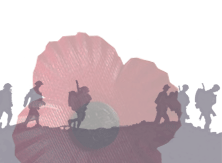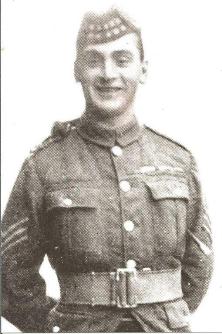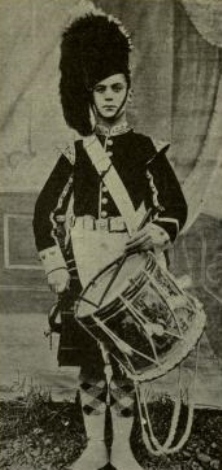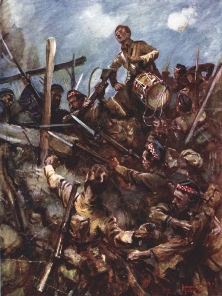Walter Ritchie VC
Their names will be remembered for evermoreIt was the heat and roar of battle. Men were falling in their hundreds on no man's land as a charge on the German lines was cut down by machine guns. Amid the terror and confusion of the first day of the Somme, a wounded drummer made it to the German parapet and, using a German bugle, he rallied his fellow Highlanders to charge. The action saw Walter Ritchie honoured with a VC. It was a change of fortune which only the confusion of war could have created, because he had potentially faced a court-martial. He had wrested the bugle from a German soldier. Determined to Join Up Ritchie was born in Hopehill Road, Maryhill in 1892. As a teenager, he was apprenticed to a blacksmith, following his father's trade. He joined the 8th (Territorial) Battalion of The Scottish Rifles as a boy drummer and, aged 16, lied about his age to enlist in the regular army in 1908. His parents tried to make him leave The Seaforth Highlanders, but Ritchie was adamant: "I want to be a soldier". At the outbreak of war, he was posted to France with the British Expeditionary Force and saw action at the Battles of the Marne, Aisne, Messines and Armentieres, where he was wounded in the head. On 1 July, 1916, the Seaforths were advancing against German positions at Beaumont Hamel, but by midday shortages of ammunitions had forced a disorganised retreat. Ritchie had been wounded in the knee, but as an interviewer later put it: "He raced through the Germans' deadly fusillade and, mounting the enemy parapet, sounded the charge". The citation for the Victoria Cross read: "For most conspicuous bravery and resource, when on his own initiative he stood on the parapet of an enemy trench and under heavy machine gunfire and bomb attacks, repeatedly sounded the "charge", thereby rallying many men of various units who, having lost their leaders, were wavering and beginning to retire." Ritchie's father was by then the caretaker of the Canal Boatmen's Institute in Port Dundas, Glasgow. It was at his home there that journalists broke the news of Ritchie's VC to his parents. Regulations Ignored Press reports at the time read: "Like a bombshell, Mrs Helen Ritchie made the chance remark that Walter had been court-martialled for dropping and losing his drum in action and picking up a rifle." Mrs Ritchie assured the press that the reprimand was a formality. He had in fact disregarded regulations about taking instruments into the trenches and he himself later commented that had things gone the other way, he would have been court-martialled, not decorated. After receiving his VC at Buckingham Palace, Ritchie was reticent about his bravery, often saying: "I like to forget about these things this side of the Channel." The Boatmen's Institute awarded him a gold watch and £23. He was also awarded the French Croix de Guerre. Ritchie married in 1919, and continued to serve the army until 1929, retiring as a drum major, after which he became a school attendance officer in Glasgow. He rejoined a territorial unit as a senior non-commissioned officer during the Second World War and worked in a Glasgow army recruiting office. He died in Edinburgh in 1965. The bugle is now in the Highlanders museum at Fort George, near Ardersier. Walter Ritchie's citation in The London Gazette View original referenced text here: |
Images:
|















